Nikki Skies
“Add her name to the list of the forgotten.” Poet Nikki Skies reads her poem “Say Her Name” at a performance for All Def Poetry.
Jump to navigation Skip to content
“Add her name to the list of the forgotten.” Poet Nikki Skies reads her poem “Say Her Name” at a performance for All Def Poetry.
Margo Perin is the author of the novel The Opposite of Hollywood (Whoa Nelly Press, 2015) and editor of Only the Dead Can Kill: Stories From Jail (Community Works/West, 2006) and How I Learned to Cook: And Other Writings on Complex Mother-Daughter Relationships (Tarcher/Penguin, 2004). She has taught writing to incarcerated populations, people challenged by life-threatening illnesses, migrants, refugees, elders, and at-risk youth and adults, and has been featured in the San Francisco Chronicle Magazine, O Magazine, and on NPR's "Talk of the Nation." She blogs about a recent P&W-supported writing workshop she conceived and facilitated for San Francisco youth under the auspices of California Poets in the Schools.
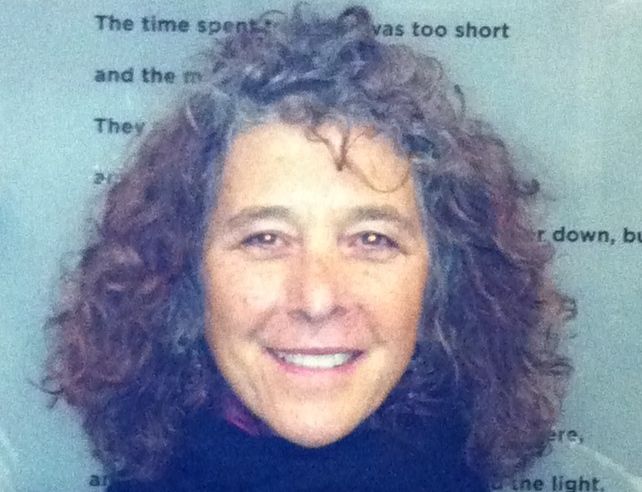 In September and October 2015, I embarked on a series of workshops that linked formerly incarcerated and at-risk youth at the Success Center San Francisco with high school students across the street at the Ruth Asawa School of the Arts (SOTA). I called the project Building Bridges.
In September and October 2015, I embarked on a series of workshops that linked formerly incarcerated and at-risk youth at the Success Center San Francisco with high school students across the street at the Ruth Asawa School of the Arts (SOTA). I called the project Building Bridges.
The intent of the series was to provide the opportunity for formerly incarcerated and at-risk youth to write about their often invisible life experiences as they develop their creative writing and critical thinking skills, to shed light on their perspectives, and to provide the rare opportunity to foster literary community between young writers of different socioeconomic and cultural backgrounds. The workshops would not only help build bridges between young writers, but also between Success Center and SOTA staff, and family and community members.
Success Center and SOTA youth each explored and wrote personal narratives through poetry, prose, and spoken word, and read and responded to each others’ personal narratives. In addition, both groups responded to the feedback, creating an ongoing dialogue of understanding.
The workshops culminated with a reading by Success Center youth that was attended by staff, who expressed a deep appreciation and greater understanding of the life stories and literary talents of their students. To further connect the Success Center and SOTA, I facilitated a visit to SOTA by the Success Center Client Service Specialist, who gave a presentation to students and staff on the demographics and struggles that Success Center youth commonly face. It is my hope that the relationship between these institutions will continue and help to reinforce the bridge of understanding and the literary community initiated by the generous funding of Poets & Writers.
This project was extremely enlightening in terms of highlighting the vast difference in economics, education, literacy, feelings of self-worth, social support and validation, and services for youth in the same city and, in this case, for youth attending schools directly across the street from each other. While many of the students at SOTA can expect to continue into higher education and compete for jobs in fields of their choice as they continue to develop as writers, students at the Success Center struggle every day just to attend class to get their GED and improve their literacy.
I am deeply grateful to the sponsoring organization California Poets in the Schools for their generous, honest, and steadfast dedication to their mission as they provide opportunities for youth to find and express their literary voices, and to Poets & Writers for providing the funding to work with the Success Center writers, which would not have been possible otherwise. I am hoping to share what I learned through this project with the reading public, and with other writers and educators to help further "building bridges" between diverse populations.
Photo: Margo Perin. Photo credit: Marci Klane.
Major support for Readings & Workshops in California is provided by the James Irvine Foundation and the Hearst Foundations. Additional support comes from the Friends of Poets & Writers.
S. Bryan Medina is a former student of U.S. poet laureate Juan Felipe Herrera and his poetry has graced stages in the San Francisco Bay Area, Los Angeles, Las Vegas, and Kansas City. He founded the Inner Ear as a way to free poetry from the confines of academic institutions, making it accessible to all. Medina has been awarded two City of Fresno Commendations, including the 2014 Fresno Arts Council Horizon Award, for contributions to the rich artistic and cultural heritage in Fresno, California. He has been featured as one of the four “Fresno Poets” from writer Nick Belardes’s Distinguished Valley Writers series, and he was an honorable mention for the 2006 Larry Levis Poetry Prize. His work has appeared in journals such as Flies, Cockroaches, and Poets, In the Grove, the San Joaquin Review, Jubilee, and Invisible Memoirs. Medina is a recent graduate of Fresno Pacific University and plans to teach special education.
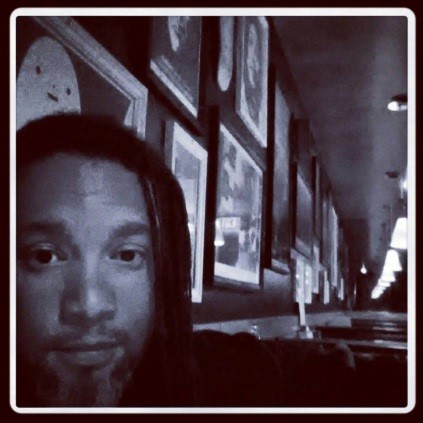 “Poets here (in Fresno) write killer poems in our unapologetic heat, the exhaust of the traffic, or the dream-inducing tule fog.” —Fresno poet laureate Lee Herrick, author of Gardening Secrets of the Dead (WordTech Editions, 2012)
“Poets here (in Fresno) write killer poems in our unapologetic heat, the exhaust of the traffic, or the dream-inducing tule fog.” —Fresno poet laureate Lee Herrick, author of Gardening Secrets of the Dead (WordTech Editions, 2012)
Central Valley writers seem to revel in Fresno’s bad air and harsh laundry line of obstacles. Its writing history comes from just underneath its rich soil, from the bent backs of field laborers to the city’s war on drugs against the black market methamphetamine trade. The place often found at the top of many “Worst Cities in America” lists now can add to its reputation little to no water, thanks to the drought.
Still, Fresnans continue to find bars and converted backyard stages, open mics and coffee houses, filled with hungry ears eagerly listening for their favorite local poet to say one more thing just before the familiar, “Are y’all ready for the next poet?!” I’m proud to be a part of this scene, now thirteen years strong, keeping spoken word/poetry in the forefront of people’s minds here in the valley by forging and solidifying relationships, such as the one I have with Poets & Writers.
The Inner Ear’s mission is to collaborate with local and national artists utilizing spoken word, art, performance, and music to promote further interest in the arts in Fresno and the Central Valley. The Inner Ear/Beat Down Slam events serve the community by providing a forum for constructive and creative expression in a positive and supportive environment, offering an alternative to violence among Fresno County teens and young adults. The Inner Ear mixes formal poetry aesthetics with rap flair and vitality by taking poetry away from the ivory tower of the universities and moving it to a place where everyone has access. Over the past decade, we have had many participants say that our stage was their first.
This October finds the Inner Ear beginning a yearlong collaboration with the Fresno Grand Opera. Breaking new ground with its first Opera Remix: Music & Verse event, an exciting mix of local spoken word artists and opera musicians will perform together live on the stage of the historic Tower Theater in Fresno’s Tower District. In the months between this and next year’s event, we are excited to get the chance to work with composer Jakes Heggie and Librettist John de los Santos, and share new music by composer Ricky Ian Gordon (Grapes of Wrath) from the Metropolitan Opera in New York!
On November 12, the Inner Ear celebrates its thirteenth anniversary with a tribute to fellow Fresno poet and former U.S. poet laureate Philip Levine, which will feature poets Corrinne Hales and Lee Herrick with other local writing notables, and music by Benjamin Boone. If you have never experienced in person one of our blowout anniversary events, you're missing what the Fresno scene is all about: fun, exciting, deep, edgy, and funny performances with live music and special guests all happening at the Fresno Art Museum.
To some, poetry is a mystical, invisible power—energizing raw, untamed thoughts put to paper or read aloud in public places. But here in the valley, that slow rhythmic sound you hear is the tactile heart of Fresno’s present, future, and past: the shadow of Philip Levine saying “What Work Is,” the familiar mustache and glasses of Juan Felipe Herrera, the mournful prose of an Andres Montoya poem. Poets here have to write killer poems and produce worthwhile poetry events that are as tangible as the fruit grown here, in the middle of nowhere, where we’re right at home, struggling.
Photo: S. Bryan Medina Credit: S. Bryan Medina
Major support for Readings & Workshops in California is provided by the James Irvine Foundation and the Hearst Foundations. Additional support comes from the Friends of Poets & Writers.
Michael Kearns spent ten years as the artist-in-residence at the Downtown Women’s Center in Skid Row and currently helms Writing Works at Housing Works in Los Angeles on a weekly basis. He is the creator and Artistic Director of QueerWise, a collective of GLBTQ writers who have gained a reputation as one of Los Angeles’s stalwarts in the world of spoken word performance.
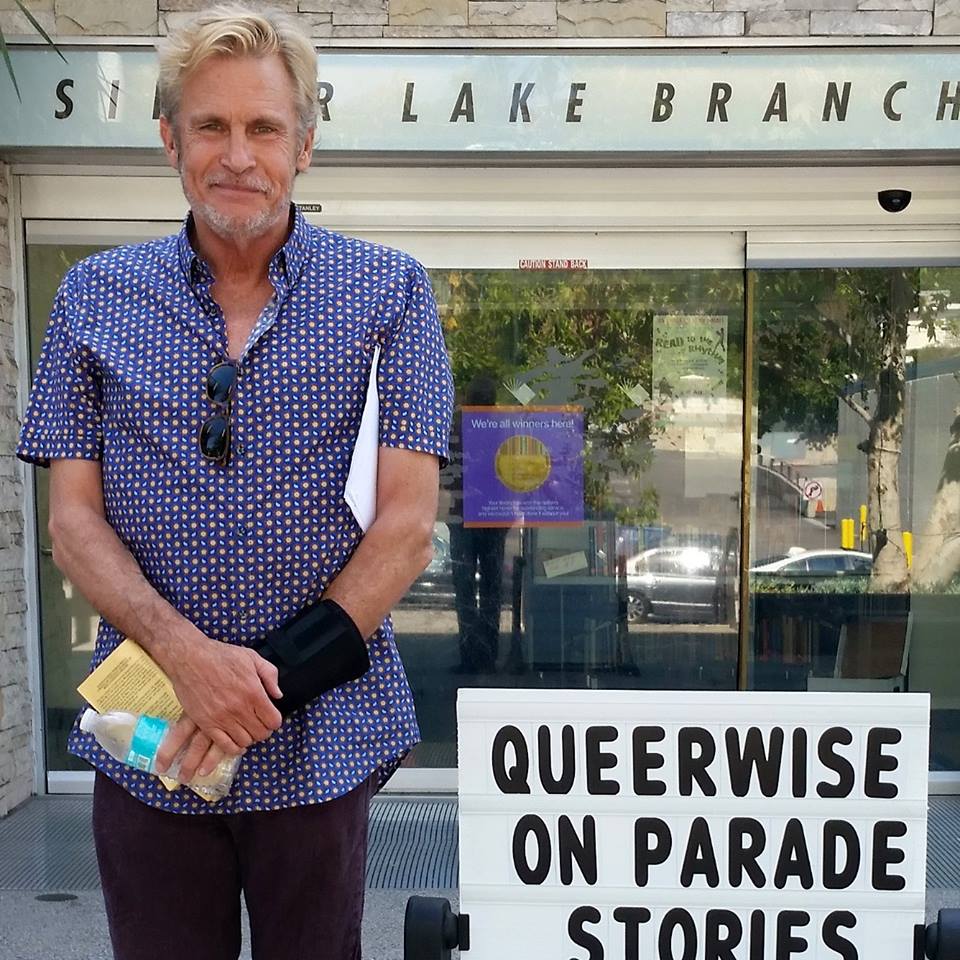 What makes your workshops unique?
What makes your workshops unique?
I really spend a lot of time on the prompt and aim for specificity—the same thing I ask of my students. In the case of QueerWise, which meets fifty-two weeks out of the year, it is my responsibility to mix the palette—from the political to the personal, from the past to the present, from the angst of day-to-day to the joy of living more than five decades. I am also very clear about feedback from the group, insisting that no one “rewrite” but rather offer positive comments that embolden rather than weaken each other. Criticism is contextualized in the form of questions that may be pertinent to understanding the material; no rewriting suggestions, please.
What techniques do you employ to help shy writers open up?
A writer must feel safe. I can’t say, “Abracadabra! You’re safe.” But I can create a tone. I stress that no one in the room is there to judge and if I get a whiff of it: “See you later, alligator.” While I look at grammar and punctuation (and provide assistance when needed), I also assure students that I’m looking for stories. And I want heart as well as blood and guts. Humor never hurts.
What’s the strangest question you’ve received from a student?
It likely had to do with sex, but I’m too old to remember.
What has been your most rewarding experience as a workshop leader?
There are so many. I had a man in his fifties come into my workshop, having never written a word. He had been on the verge of death for more than a decade, defying throat cancer on a daily basis. From the first few sentences he read aloud, I knew he was a natural born writer. He had only recently found housing, after living in his van. I looked at his work and simply gave it the attention it deserved. I forcibly made him acknowledge that he is indeed a writer. This led to him going to college to take a writing class and seeking other writing teachers (which I encourage as long as he stays with me). There are times when a person must utter the four scary words: “I am a writer.” That's when the real work begins.
What effect has this work had on your life and/or your art?
My life and art are virtually melded and QueerWise enunciates that marriage. I take this work as seriously as I do any other aspect of my varied career. What began as a group of seven or eight writers (GLBT and over fifty) sitting around a table has—in four years—evolved into a successful troupe of Spoken Word Artists. That couldn’t have happened without the support of Poets & Writers. I learn from each student’s particular perspective, and I also learn when I evaluate how the material is landing on various audience members. That synergy gives me and my art a true uplift of the spirit.
What is the craziest thing that’s happened in one of your workshops?
In our QueerWise sessions, everyone is encouraged to get up and read (with no apologies, by the way). One night, our senior member (a mere eighty-five years old at the time), walked up to the music stand, confidently carrying a notebook containing his work for the evening. I don’t think he’d uttered a complete sentence when his pants fell to the floor, like a Barnum & Bailey clown act. Since we all share a palpable closeness, it was permissible to laugh. And no one laughed louder than Joe who, for the record, was wearing his Calvins.
Photo: Michael Kearns Credit: Lisa Palombi
Major support for Readings & Workshops in California is provided by the James Irvine Foundation. Additional support comes from the Friends of Poets & Writers.
"I tell people that spoken word poetry is a type of poetry that doesn't just want to live on paper, that something about it demands to be heard out loud and witnessed in person." For the first installment of PBS NewsHour's "Brief but Spectacular" series, Sarah Kay talks about the importance of making poetry accessible and reads her poem "The Paradox."
"The great thing with poetry is that you can hide a lot of your feelings and a lot of your truth in metaphor, and that's why I felt safe." In this teaser for a documentary from BBC Radio 1, spoken word poets share stories of their first experiences writing poems and how poetry has made an impact on their lives.
In this short film by Echelon Creative Studio, spoken word poet Holly Painter shares her experiences on becoming a poet and what storytelling means to her. Painter is a teacher, public speaker, and two-time Grand Slam Champion of the London Poetry Slam in Canada.
Beth Gorrie volunteers her time as Executive Director of Staten Island OutLOUD. She spearheads the organization’s program planning and has adapted over twenty-five global classics for OutLOUD’s spoken-word performances. As an actor during the first few years of her working life, she performed with the Chicago Theatre of the Deaf and served as an Adjunct Instructor at the University of Chicago. In New York City, she appeared in a variety of Off-Off Broadway productions and in a series of film installations by award-winning filmmaker William Lundberg, a recipient of the Guggenheim Fellowship. Gorrie attended Columbia University Law School where she was an editor of the Journal of Law & Social Problems, and spent a summer in rural India on a human rights fellowship. She is a former partner in a leading New York law firm and has participated in community service in Harlem.
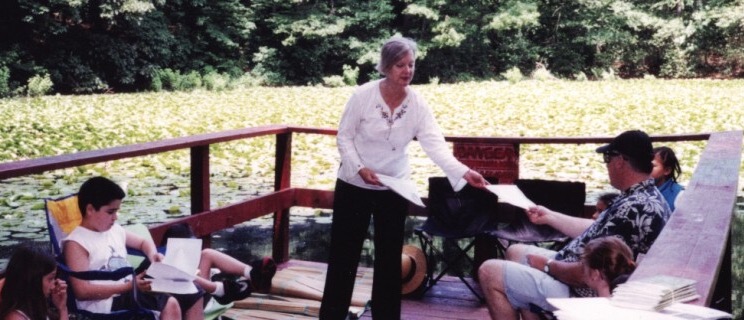
What makes your programs unique?
Staten Island OutLOUD gathers neighbors to explore global literature together, and to share ideas. Our first event took place shortly after September 11, 2001 when we had a deep need to gather together.
Since then, Staten Island OutLOUD has grown and has continued that spirit with a varied series of grassroots gatherings. Throughout the year, we host free events to explore global literature, our diverse backgrounds, our history, and our mutual concerns. OutLOUD is entirely volunteer-driven.
We operate on a small budget, but we’re very productive. Since our establishment in September 2001, we’ve served over 23,000 participants with over six hundred free events, in twenty-one languages.
What recent project have you been especially proud of, and why?
From September 2014 through March 2015, Staten Island OutLOUD hosted a series of forty community events about Harper Lee’s novel To Kill a Mockingbird. When we started planning our series a year earlier, we never guessed how timely it would be, following the July 2014 death of Eric Garner, an African-American neighbor of ours who died in police custody.
Our “Mockingbird” series explored national and local civil rights history, together with music and poems from the Civil Rights Movement, and from the Depression years in which the novel is set.
Tensions ran high during the months after Garner’s death, but our series fostered thoughtful discussions. Staten Islanders talked, listened, and considered the many facets of the crisis.
What’s the most memorable thing that’s happened at an event you’ve hosted?
Adults with special needs sometimes attend Staten Island OutLOUD programs. At one event when we discussed a variety of twentieth-century poems, a woman with mental disabilities gathered her courage to comment on a poem by Dylan Thomas. She had never spoken in public before, and she knew that the audience included teachers, attorneys, and other professionals. Everyone encouraged her, and as she spoke, she began to hold herself more confidently, and her voice grew stronger. Everyone was moved when she read, “Do not go gentle into that good night.”
What are the benefits of writing workshops for special groups?
Staten Island OutLOUD’s work proves that when people have a forum and a stimulating entrée for conversation, they respond thoughtfully. Stereotypes can fade and real communication can begin. Our work with teens and with elders underscores the value of writing workshops for those members of our community. Our writing workshops have enabled people to find their unique voices. For teens who may have manifested behavior problems before they began our workshops, some of those problems began to ebb as they focused their energy on writing and as they gained confidence in their work. Elders who had never done any creative writing before participating in our memoir and poetry workshops have drawn real satisfaction in exploring their writing talent, in reflecting on their life experiences, and in recognizing how powerful their pens can be.
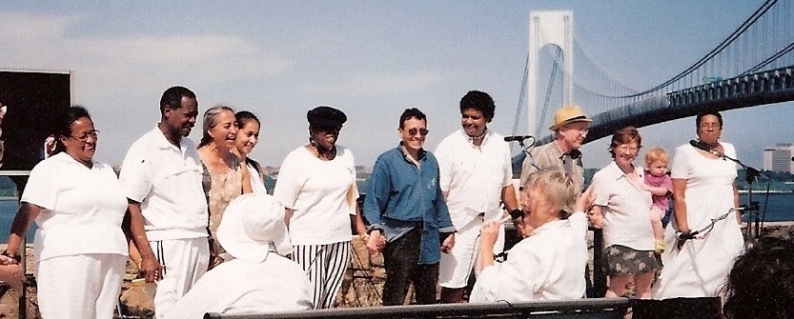
Photo: (top) Beth Gorrie at Huckleberry Finn at High Rock workshop. Photo: (bottom) Cast of Moby Dick marathon reading. Photo Credit: Staten Island OutLOUD.
Support for Readings & Workshops in New York City is provided, in part, by public funds from the New York State Council on the Arts, and the New York City Department of Cultural Affairs, with additional support from the Louis & Anne Abrons Foundation, the Axe-Houghton Foundation, the A.K. Starr Charitable Trust, and the Friends of Poets & Writers.
Kevin Coval and Nate Marshall, editors of the poetry anthology The Breakbeat Poets: New American Poetry in the Age of Hip-Hop (Haymarket Books, 2015), speak about the impact hip-hop has had on poetry and on their own writing.
Alanna Lin Ramage is a writer, songwriter, and artist-in-residence at the Los Angeles Little Tokyo Branch Library, where she hosts innovative, community-building events and workshops at the Los Angeles Department of Writing and Power (LADWP!*). She has studied poetry with Thomas Sayers Ellis and poetics and performance theory with Jon Wagner and Mady Schutzman at California Institute of the Arts. Ramage composes original lyrics and music for film and television. This year sees the release of a cover album inspired by the Beatles in tandem with publishing her first collection of poems about monastery wildlife in Northern California.
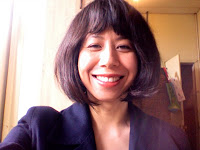
A few years ago, in a fit by candlelight, I came up with a syllabus for a workshop called Alters/Altars. It was designed to help a person write and explore their way into an alter ego—the poetic self that feels its own voice and power while feeling all, but not revealing all.
In February of this year, thanks to support from Poets & Writers and the Little Tokyo Branch Public Library, I was able to teach a five-week version of the workshop in downtown Los Angeles.
One premise I was working with included the physical effect of writing as a physical act. For each class, participants would read their pieces aloud and receive positive feedback from the group. In some cases the reading would be formal, at the front of the room. On other days, I had readers stand in the middle of a group circle that echoed words or phrases as the story unfolded. One writer noticed that she read to a mostly quiet circle. She later commented that she realized she had to read "painfully slowly" to give listeners a chance to register her words more fully. She reread her piece to us and we happily listened to every word.
In another exercise, we gave alternate names to one another. The unspoken invitation was: “What name suits me in your opinion? What is my sonic incarnation? Do you really think it’s ‘Bubby?’”
The first workshop started with participants reading personal biographies or ads, and then writing fictional personal ads for someone other than themselves. The exercise allowed us to get to know each other while ascertaining each person’s unique writing style. Week two’s life stories were especially intense, offering glimpses into epic quests for love and destiny. Week three featured hypothetical after-life sequences from each person—revealing visions of beautiful, earthy, sublime, and often hilarious realities to come.
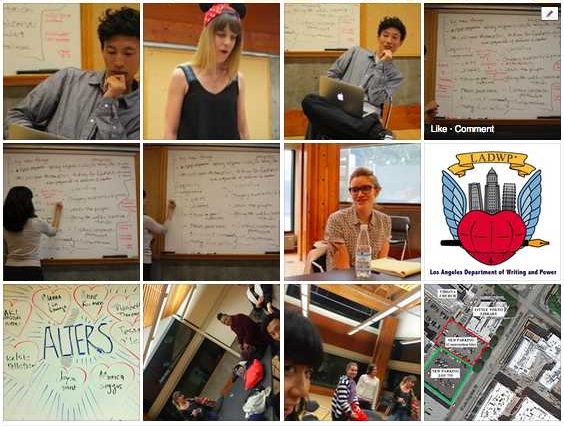 We had a dynamic, talented, and punctual group. It was a pleasure to discuss personal creative journeys, hear the mix of angst, frustration, wisdom, confidence, and steady determination that characterized each person. The group had great discussions about what makes a “healthy writer” versus what makes a “happy writer.”
We had a dynamic, talented, and punctual group. It was a pleasure to discuss personal creative journeys, hear the mix of angst, frustration, wisdom, confidence, and steady determination that characterized each person. The group had great discussions about what makes a “healthy writer” versus what makes a “happy writer.”
My favorite session of the workshop included an assignment that asked participants to write about a sublime or transcendent moment. The results were diverse and fantastic. There was a great relationship-ending-epiphany story, an excellent dim-sum-as-travel-as-exploration-of-life story, a profound unity-with-wild-crustaceans story, and a stirring overcoming-self-while-overcoming-mountain story.
The session made me think about how creative anxiety can sometimes blind us to the larger themes we've experienced in life. It may keep us from sharing the stories we’ve already lived or from inventing stories that might express what we know.
So how do we move past this anxiety? Decide what themes are important to you based on your life experience. Once you have: Write on! (OK, that was a bad pun. I’m a workshop leader—it’s allowed.)
Writing alters you. Be brave and do the work; you just might tell a riveting story as you sacrifice your fears.
Photo 1: Alanna Lin Ramage; photo 2: Alters/Altars workshop. Credit: Alanna Lin Ramage and Anne Rieman.
Major support for Readings & Workshops in California is provided by the James Irvine Foundation. Additional support comes from the Friends of Poets & Writers.